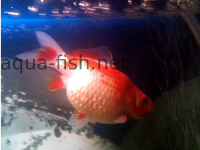The Dropsy Disease in Fish- Development, Cure, Prevention & Forum
Quick links - Answers
Brief Description
This page covers dropsy disease in fish. We also have forum under the article so in case your question isn't answered on this page yet, we'll gladly answer. Sharing experiences and tips is welcome too!
picture source - fishtankforum.co.uk, reprinted with permission

Dropsy is instigated by bacteria thriving in polluted water, even if it's only slightly tainted. The likelihood of contracting this illness increases in fish inhabiting stressful environments, as stress undermines their immune system, making them more susceptible. Compounding matters, Dropsy targets its victims gradually, affecting fish one by one rather than all at once. Typically, the initial casualties are the weakest individuals.
The development of the dropsy disease
The disease manifests as a bacterial infection within the fish's gastrointestinal tract. Its onset is indicated by mucus-covered excrement, decreased appetite, and the presence of long, transparent, mucus-like strands hanging from the anal opening. As the infection progresses, the gut mucosa deteriorates, leading to a reduced ability to consume food. This dysfunction extends to the kidneys, resulting in urinary tract infections and dysfunction of other internal organs. Without proper treatment, the kidneys fail to filter excess water from the body, leading to bloating and swelling. Additionally, the eyes may protrude, and scales may become dislodged. Failure to intervene promptly, despite the fish's deteriorating condition, will ultimately result in organ failure and a painful death.
The cure
There are several antibacterial medications available on the market. It's crucial to administer them according to the instructions at the first sign of symptoms. In advanced stages of the disease, where the fish is bloated and has protruding eyes, it's necessary to isolate the affected specimen and administer double the recommended dosage. However, this treatment carries its own risks. While the antibacterial medications effectively combat the disease, they also kill beneficial nitrifying bacteria present in the filter. Therefore, it's advisable to remove the filter from the tank during treatment. Ideally, the filter should be placed in another container with water to ensure the survival of the beneficial bacteria.
The prevention
Stress affects all living beings, including humans and fish. Confinement in an ordinary aquarium can induce stress in fish, making them more susceptible to diseases compared to their wild counterparts. Stress weakens the fish's immune system, making them less able to resist diseases. Stress can result not only from fear but also from inadequate care practices. For instance, frequent fluctuations in temperature, even if within the natural range, can induce stress if they are not consistent and regular. Extreme variations, such as having temperatures of 30°C during the day and 18°C at night, can have adverse effects on aquarium life and lead to illness in fish if not addressed promptly.
Overfeeding and providing inappropriate diets are additional factors contributing to fish diseases. Proper nutrition is essential for fish health, requiring a balanced diet rich in vitamins and minerals. Imbalances in nutrient intake can have severe consequences, leading to fatal health issues. Keeping incompatible fish species together can also lead to stress and disease, particularly if one species harasses another. Overcrowding exacerbates these problems, as crowded conditions are not conducive to maintaining healthy aquatic life.
Regular water changes are essential for promoting fish health. It's crucial to avoid changing the entire volume of water in the tank, as this can disrupt the delicate balance of the ecosystem. Instead, replacing 10%-20% of the water periodically helps maintain water quality without causing undue stress to the fish. Additionally, supplementing the fish's diet with vitamin C can boost their immune system, helping them resist diseases more effectively.
